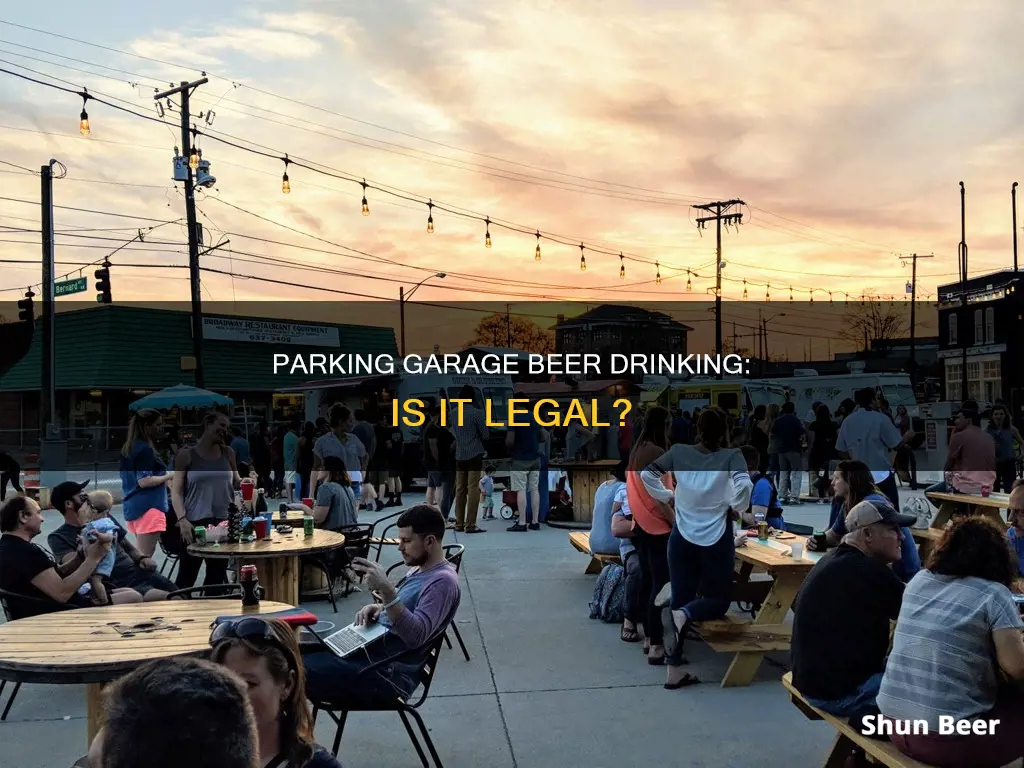
Drinking and driving is a serious issue that can lead to dangerous accidents and legal consequences. In the United States, open container laws prohibit possessing and consuming alcoholic beverages in motor vehicles and public places. While laws vary by state and community, most states ban open containers of alcohol in vehicles to prevent drunk driving and maintain public safety. Drinking in a parked car, whether in a parking garage or on private property, can result in legal consequences, including fines and DUI charges. Understanding and complying with local laws is essential to avoid penalties and ensure responsible drinking behaviour.
| Characteristics | Values |
|---|---|
| Drinking beer in a parking garage | Illegal in most states |
| Open container laws | Prohibit possessing and drinking alcoholic beverages in vehicles and public places |
| Open container | Any bottle, can, or receptacle containing alcohol that is open, has a broken seal, or has had some of its contents removed |
| Motor vehicle open container laws | Prohibit open containers of alcohol in a motor vehicle operating on a public highway or right of way |
| Public place open container laws | Prohibit possession of an open container of alcohol in public places outside of private places like homes, clubs, or restaurants |
| Exceptions | Las Vegas, New Orleans, and Indianapolis |
What You'll Learn

Drinking beer in a parking garage may be illegal due to open container laws
Open container laws typically apply to both motor vehicles and public places. Motor vehicle open container laws prohibit open containers of alcohol in vehicles operating on public highways or rights of way, while public place open container laws ban the possession and consumption of alcohol in public areas outside of private residences, clubs, or restaurants. In the context of drinking beer in a parking garage, both types of open container laws could be relevant.
For example, if you are drinking beer inside your car in a parking garage, you would likely be violating the motor vehicle open container law. On the other hand, if you are standing or sitting in the parking garage and drinking from an open container, you could be violating the public place open container law. In either case, it's important to note that the specific laws and regulations may vary depending on your location.
The consequences of violating open container laws can vary as well. In some jurisdictions, you may receive a citation or a fine, while in others, you could face more severe penalties, including jail time. Additionally, if you are found to be driving under the influence (DUI) or operating a vehicle while impaired, you will likely face even more serious charges and penalties.
It's worth noting that there may be exceptions to open container laws in certain designated areas, such as entertainment districts or tourist destinations like Las Vegas and New Orleans. However, these exceptions are typically limited, and it's important to be aware of the specific laws and regulations in your area.
Beer: World's Savior, Ancient Beverage
You may want to see also

Drinking in a parked car is illegal in Ontario, Canada
Section 41 (1) of the Liquor License and Control Act of 2019 states that "no person shall have or consume liquor in any place other than" a licensed premises, a private place as per regulations, or a designated public place. This means that drinking in a parked car on public property is illegal.
While Section 41 (2) allows for the possession of alcohol in a "closed container," Sections 42 and 43 further restrict the conveyance of alcohol in motor vehicles. Alcohol must be in an "unopened and seal unbroken" container or packed in baggage that is "fastened closed or not otherwise readily available to any person in the vehicle."
These laws are enforced to prevent drinking and driving, as well as to control access to alcohol while in a vehicle. Even if the driver is not drinking, passengers with open containers can result in fines for both the passenger and the driver.
The fines for violating these open container laws vary but can be costly, ranging from $100 to $175 for a passenger and up to $180 for a driver. These fines are in addition to any other charges that may be laid, such as public intoxication or driving under the influence (DUI).
It is important to note that the legal definition of an alcoholic drink in Canada is any beverage "containing 1.1% or more alcohol" by volume. Therefore, it is illegal to have any open container of alcohol, including beer, wine, or liquor, in a parked car in Ontario, Canada.
Beer Benefits for Hair: A Guide
You may want to see also

Drinking in a parked car is illegal in Ohio, USA
Ohio's open container law is very expansive and bans open containers for both drivers and passengers, even if the vehicle is stationary. The only exceptions to this law are for passengers of chauffeured limousines and for opened bottles of wine. For limousines, passengers can drink beer or intoxicating liquor if they have paid a fee pursuant to a prearranged contract and are not occupying the front seat of the limousine where the operator is located. For wine, an opened bottle purchased from a licensed vendor is not considered an open container if it is securely resealed and stored in the trunk or behind the last upright seat, in an area not easily accessible by the driver.
Violating the open container law in Ohio can result in fines and even jail time. Possessing an open container is a minor misdemeanour, punishable by a fine of up to $150. Consuming alcohol in a vehicle is a fourth-degree misdemeanour, punishable by a fine of up to $250 and up to 30 days in jail. Underage offenders may face additional penalties, including license suspension or community service.
While Ohio's open container law specifically addresses motor vehicles, it is worth noting that drinking in public places is generally illegal in the United States, with penalties ranging from fines to jail time. Therefore, it is essential to be aware of local laws and regulations before consuming alcohol in any public setting, including parking garages or parked cars.
Concussion and Beer: A Dangerous Mix?
You may want to see also

Drinking in a parked car is illegal in California, USA
The law defines an "open container" as any bottle, can, or receptacle that has been opened, has a broken seal, or has had some of its contents removed. This means that even if a bottle of alcohol is unsealed but full, it is still considered "open". The container must be kept out of the driver's and passengers' reach, in the trunk or a locked area.
The only exceptions to this law are if you are in a taxi, limousine, or another licensed vehicle for hire; if you are in a camping bus or boxcar in its living quarters; or if you are carrying open containers in a locked box or closed compartment, such as the trunk of the vehicle.
If you are found to be drinking in a parked car, you can face charges under CA Vehicle Code 23221. This is considered an infraction, like a speeding ticket, and not a misdemeanour. The penalty is usually a fine of up to $250. However, if you are under 21 years of age, the consequences can be more severe, with penalties of up to 6 months in jail and up to a $1,000 fine.
California also has laws against public intoxication and possessing an open container of alcohol in public. Public intoxication is defined as being so drunk that you are unable to care for yourself or others. It is considered a form of disorderly conduct and is a misdemeanour offence, punishable by up to 6 months in county jail and/or probation for a first offence.
It is also illegal for minors to possess any alcohol in public, which is also a misdemeanour offence. Therefore, drinking in a parked car, especially for minors, can lead to serious legal consequences in California, USA.
Beer and Painkillers: How Does Ibu Work?
You may want to see also

Drinking in a parked car is legal in certain US states and cities
Drinking in a parked car with open containers of alcohol is illegal in most US states and cities. Nearly every state bans open containers of alcohol in vehicles, with around 40 states and the District of Columbia having open container laws related to motor vehicles. These laws prohibit the possession and consumption of alcoholic beverages in motor vehicles on public highways or rights of way. However, some states and cities have more relaxed laws or loopholes that allow drinking in parked cars under certain circumstances.
For example, in some states, it may be legal to drink in a parked car on private property, such as in a driveway or on a residential street. In other states, there may be exceptions for designated entertainment districts or special events. Additionally, some states may allow passengers to drink or possess open containers in a vehicle, as long as the driver is not drinking.
It's important to note that even in states or cities where drinking in a parked car is legal, there may still be restrictions on public intoxication, disorderly conduct, or other quality-of-life laws that could result in legal consequences. Additionally, open container laws may vary between states, and it's essential to be aware of the specific laws and regulations in your area.
In Ontario, for example, it is illegal to drink alcohol in a parked car, and doing so can result in fines or other penalties. The province's Liquor License and Control Act includes over 116 separate alcohol-related offences, aiming to restrict alcohol access in vehicles. While there may be a loophole for drinking in a parked car on private property, it has not been tested in court, and individuals risk facing charges if caught by law enforcement.
Beer and Aimovig: What You Need to Know
You may want to see also
Frequently asked questions
Drinking beer in a parking garage is illegal in most states. Open container laws prohibit the possession and consumption of alcoholic beverages in motor vehicles and public places.
Open container laws prohibit possessing and drinking alcoholic beverages in two distinct areas: motor vehicles and public places.
An open container is defined as any bottle, can, or other receptacle that contains any amount of alcoholic beverage and is open, has a broken seal, or has had its contents partially removed.
Penalties for open container violations vary among the states. Motor vehicle open container offenses tend to carry greater punishments than public drinking infractions, which may result in a citation and a fine.







